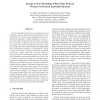Free Online Productivity Tools
i2Speak
i2Symbol
i2OCR
iTex2Img
iWeb2Print
iWeb2Shot
i2Type
iPdf2Split
iPdf2Merge
i2Bopomofo
i2Arabic
i2Style
i2Image
i2PDF
iLatex2Rtf
Sci2ools
162
click to vote
RTSS
2007
IEEE
2007
IEEE
Energy-Aware Scheduling of Real-Time Tasks in Wireless Networked Embedded Systems
Recent technological advances have opened up several distributed real-time applications involving battery-driven embedded devices with local processing and wireless communication capabilities. Energy management is the key issue in the design and operation of such systems. In this paper, we consider a single-hop networked real-time embedded system where each node supports both dynamic voltage scaling (DVS) and dynamic modulation scaling (DMS) power management techniques to tradeoff time for energy savings. In this model, we address the problem of scheduling periodic complex tasks where each task consists of several precedence constrained message passing sub-tasks. Our contributions towards this problem are two fold. First, we analyze the system level energy-time tradeoffs considering both the computation and communication workloads by defining a novel energy gain metric. We then present static (centralized) and dynamic (distributed) energy gain based slack allocation algorithms which ...
Related Content
| Added | 04 Jun 2010 |
| Updated | 04 Jun 2010 |
| Type | Conference |
| Year | 2007 |
| Where | RTSS |
| Authors | G. Sudha Anil Kumar, G. Manimaran |
Comments (0)

